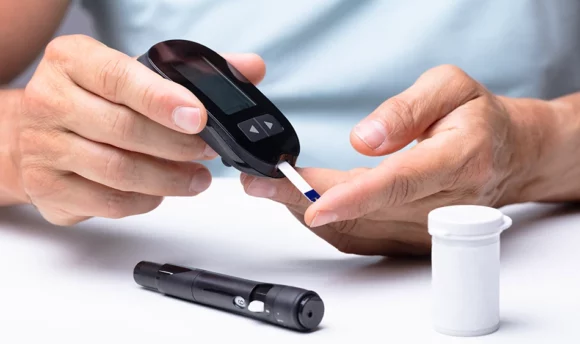Keto Flu – Symptoms, Prevention, and Remedies
The keto flu may result from adopting a keto diet. On a keto diet, your body goes into a metabolic state of burning fat for energy instead of carbs. The symptoms accompanying this state of ketosis have been dubbed keto flu, and we’ll discuss the symptoms, prevention, and remedies for combating this flu.

You have finally started the keto journey, thanks to its numerous health benefits. However, you experience a foggy brain, headache, irritability, and other symptoms after a few days. Congratulations, you are experiencing keto flu symptoms.
The keto flu happens once you suddenly minimize the carbs from your diet. People respond differently when experiencing these withdrawal symptoms of a low-carb diet.
The keto flu is an umbrella term describing the symptoms experienced by users at the beginning of a keto diet. This article uncovers the keto flu, its symptoms, effects, and methods for alleviating some of its symptoms.
Keto Flu – What Is It?
The keto flu refers to the symptoms people experience after adopting a keto diet. You may experience flu-like symptoms from the body trying to adapt to a diet with minimal carbs.
Some keto flu symptoms include bad keto breath, headaches, vomiting, nausea, and fatigue. When the body doesn’t have enough carbs, it will burn fat for energy instead of carbs.
Ketones, a byproduct of fat breakdown in the body, are the main source of fuel in a keto diet. Drastic reduction of carbs shocks the body, making it experience carbohydrate withdrawal symptoms.
Fortunately, the keto flu is temporary, and the symptoms disappear if one sticks to a strict keto diet.
When does keto flu start?
Keto flu symptoms typically show up within the first few weeks, especially the first 2–7 days after adopting a ketogenic diet. This window varies among individuals; some report getting keto flu in as little as 24 hours.
The flu starts immediately after the body stops burning sugar and starts burning fat. Research suggests that most people can only store up to 500g of carbs as reserve glycogen stores.
How long does keto flu last?
The keto flu normally lasts the first week of a keto diet, but in some extreme cases, it may last a month. As your body gets into ketosis, sugar cravings subside, and the body metabolizes fatty acids more efficiently.
Most people report feeling better than when they started the keto diet when the symptoms subside.
Symptoms of Keto Flu
Adopting a low-carb diet is a major dietary change, and your body might need some time to transition to this new lifestyle. The symptoms are usually mild and taper off as one gets used to the diet. Most keto dieters experience the following symptoms.
#1 Vomiting and nausea
Vomiting and nausea are among the symptoms of the keto flu. As your body enters ketosis, it burns a lot of glycogen, and this process causes the body to lose electrolytes.
Burning fat also makes you lose a lot of water, leading to dehydration. These changes in the body will make you feel nauseated, and you will feel the urge to throw up. It is advisable to drink enough water proportionate to your body weight to try and minimize these symptoms.
#2 Headache
Glucose is the primary fuel source for the brain. However, the body burns fat for energy instead of glucose during ketosis. The shift to ketones and a significant drop in your blood sugar levels can strain the brain resulting in mental fatigue, brain fog, and headaches.
People who shift to ketosis will likely experience dehydration due to frequent urination. During ketosis, the body produces less insulin due to the low consumption of carbs.
Low insulin levels affect the body’s electrolyte levels, which play a pivotal role in hydration. Dehydration then contributes to keto headaches.
#3 Diarrhea or constipation
Once you adopt a new diet, it will likely affect your gastrointestinal health. The keto diet majorly contains fats and very few carbs. You might leave fiber-rich food sources to maintain ketosis, which might end up causing constipation and diarrhea.
Fiber adds bulk to the stool, thus helping the colon work like a muscle and expel waste more easily.
Diarrhea is not as common during a keto diet, but it largely occurs due to the increased fat intake in the diet. It is, therefore, best to consume fiber supplements to minimize the risk of diarrhea and constipation.
There might be a delay in the production of enzymes that break down fat in response to the increased fat intake in your diet. If the fats aren’t broken down in the small intestines, they travel to the colon leading to bloating and loose stool.
High amounts of medium-chain triglycerides from palm kernel oil, coconut oil, and butter may cause vomiting and diarrhea. Consuming foods with long-chain triglycerides, such as olive oil, is best to reduce symptoms of diarrhea and constipation.
These effects are, however, short-lived, and the body adjusts with time.
#4 Weakness
After adopting a low-carb diet, blood sugar levels drop, leading to a drop in insulin levels. Insulin makes the body retain salt and water. A drop in insulin levels makes the body get rid of water, salt, and electrolytes like potassium and magnesium.
When you feel weak, it is due to the dehydration and loss of electrolytes during ketosis. It would be best to replace the lost fluids to avoid experiencing general body weakness.
#5 Extreme fatigue
Another symptom of the keto flu is extreme fatigue. When you restrict carbs in your diet, you are likely to feel tired or lethargic as you experience cravings for high-carb food sources.
Some people also mistake a low-carb diet with a low-calorie diet and consume less than the daily recommended calorie intake. Undereating affects the body’s energy levels and the production of thyroxine and other hormones responsible for stabilizing energy levels.
Consuming fewer calories than recommended can also send your body into starvation mode, making you feel fatigued. Eating regularly and consuming enough calories is important to maintain ketosis.
#6 Muscle cramps
Like most other keto flu symptoms, most people experience muscle cramps due to dehydration and electrolyte imbalances. Electrolytes are crucial for body functioning and cell communication. When the electrolyte levels are depleted, nerves become more sensitive, and this may cause muscle spasms and cramps.
Other potential causes of muscle cramping on keto include dehydration and medications such as diuretics. Eating foods rich in potassium and magnesium and staying hydrated is one of the best ways to avoid cramps on keto.
How to Avoid Keto Flu?
Transitioning to the keto diet might be strenuous on the body. However, there are a few tips you can employ to avoid the dreaded flu.
It is advisable to drink enough water on keto to avoid dehydration. Dehydration is associated with numerous keto flu symptoms like headaches, nausea, and constipation. Drinking more fluids makes you feel full and more satiated.
Eating foods rich in magnesium and potassium helps one avoid electrolyte imbalances. These foods include pumpkin seeds, broccoli, mushrooms, cashews, and kale.
Getting enough sleep on keto is also best to combat your zapped energy. Consuming slightly high sodium content also helps alleviate the keto flu symptoms, as diuresis leads to sodium loss and dehydration.
It is also advisable to consume a high-fat diet to supplement your low-carb intake.
How to Get Rid of Keto Flu
Luckily, the keto flu is temporary, and there are some natural remedies you can use to get rid of some of its symptoms. Below are some of the natural remedies for keto flu.
#1 Drink enough fluids
A keto diet makes one rapidly shed water weight, increasing the risk of dehydration. Ketosis encourages diuresis, the process of increased urine output. The body uses up a lot of water during fat synthesis.
Dehydration ultimately causes cramping, headaches, constipation, lightheadedness, and nausea. If you have diarrhea, you are more likely to experience dehydration. It is, therefore, best to drink enough fluids to avoid dehydration.
#2 Replenish electrolytes
Electrolyte imbalance is a major culprit behind most symptoms of the keto flu. During ketosis, the body loses water and electrolytes such as sodium, potassium, and magnesium.
The ketogenic diet also restricts potassium-rich foods, such as starchy veggies and beans. The best way to replenish the body’s electrolytes is by eating keto-friendly foods rich in potassium, magnesium, and other electrolytes.
You can also drink bone broth, add salt to your food to taste, or add some sodium to your drinking water. An electrolyte supplement can help replenish your electrolyte levels, but it is not advisable to consume them more than the recommended daily requirements.
#3 Get rest
It is commonly reported that most keto dieters complain of fatigue and irritability. The best way to deal with fatigue is by having enough rest. Increased fatigue spikes cortisol levels and impacts the mood making keto flu symptoms worse.
It is, therefore, best to get enough sleep to replenish the dwindling energy levels. Getting enough sleep also helps reduce cravings, thus helping you maintain ketosis.
To improve your sleep quality, reduce distractions, minimize caffeine intake, and adopt a regular daily sleep pattern.
#4 Eat enough fat
The ketogenic diet revolves around cutting carbs, but it is also necessary to eat enough healthy fats to stay in ketosis. A ketogenic diet that’s low in carbs is essentially starving. Increasing your uptake of fats helps you have a smooth keto transition.
Fat is also more satiating and helps lower the side effects of the low-carb flu, such as hunger and cravings. Slowly lowering your carb intake and gradually increasing your fat consumption helps you transition smoothly into ketosis.
Who Should Avoid Ketogenic Diets?
Given its side effects, people with kidney damage, type 1 diabetes, or pre-existing medical conditions should avoid low-carb diets. It is also unsuitable for people with eating disorders, pancreatic conditions, or pregnant and nursing women.
Before adopting a ketogenic diet or making any dietary changes, it is best to undergo a health checkup, including allergy and blood sugar tests, to minimize health complications after starting a diet.
FAQs
Yes, as the body transitions into ketosis, you might feel more tired than usual. This fatigue happens because of the body’s switch from burning carbohydrates instead of fats for energy. Carbohydrates give the body quicker bursts of energy compared to fats.
Sometimes, you may suffer from whole body aches and muscle cramps. Lowering your carbohydrate intake leads to an electrolyte imbalance, which affects nerve responses and may lead to muscle cramps making the whole body ache. Replenishing body fluids and electrolytes minimizes these effects.
Having keto flu doesn’t always mean that your body is in ketosis. It simply indicates that your body is trying to re-prioritize how it is metabolizing its energy sources. One only reaches nutritional ketosis when the body depletes its glucose stores and produces enough ketone bodies to become the primary energy source.
A Word From Our MD
The low-carb ketogenic diet is among the safest diets recommended for weight loss. A controlled trial of a ketogenic versus low-fat diet showed that it is also used to treat obesity and manage blood pressure.
However, most people on a very low-carb diet have keto flu symptoms characterized by constipation, fatigue, and abdominal pain.
Keto flu symptoms are usually short-term and minor. It would help to adopt the diet gradually and ensure you regularly visit your healthcare provider to minimize the effects of the keto flu.
It is also advisable to consume enough fluids and electrolytes to manage the side effects of the flu. If you have any prior health conditions, such as type 1 diabetes and kidney disease, it would be best to avoid the ketogenic diet.
It is best to consult wellness professionals before making any dietary changes.
Conclusion
The keto diet is one approach for weight loss and improving overall health. However, you need to combine your new diet with a normal exercise routine for optimal results. Sometimes, you may experience the keto flu characterized by constipation, nausea, diarrhea, or vomiting.
When you experience these uncomfortable symptoms, you may be undereating, dehydrating, or having an electrolyte imbalance. Ensure you track your macronutrient intake and calories to stay within the allowable carb limit.
Consult a licensed healthcare practitioner if keto flu symptoms persist longer than expected.

















































 Select your language:
Select your language: 








